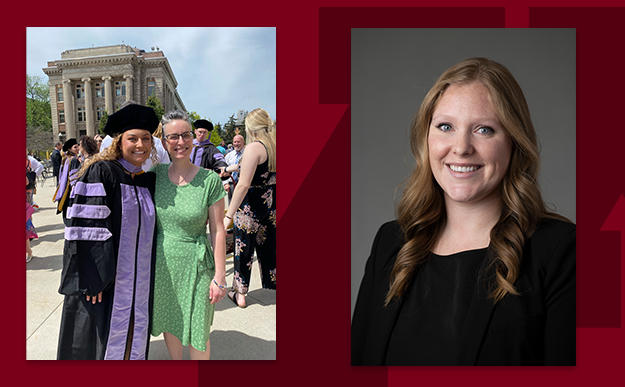Clinical mentorship program expands to foster excellence in clinical learning and care

A mentorship program that started as a way to increase comfort among clinical learners is expanding to foster excellence in patient care.
Natalie Peterson, DDS, clinical associate professor and color group leader, cares deeply about her students and her patients. When the COVID-19 pandemic and its restrictions limited the school’s clinical operations, Peterson grew concerned about her third-year learners’ ability to accomplish their clinical goals.
In discussing the concern with her senior students, an idea was born. “We thought, what if we paired everyone up?,” Peterson recalled. “Every third-year student could have someone to show them around, orient them to the clinics, maybe even give them some patients.”
The system started off simply: fourth-year learners (D4s) would be paired with a student or two earlier in their dental school journey as a way to acclimate them to the clinic. It worked well–and even became the springboard to solve additional problems. Fourth-year students in Peterson’s group eventually began transferring patients to incoming second-years (D2s) through the process of mentorship, ensuring that the early learners received plenty of patients, and established patients maintained continuity of care.
The exact details of the mentorship were left to each grouping. Peterson encourages the learners to get in touch with their mentors at least once, but does not set requirements. Some mentorships stay at that base level–but others have deep, lasting impacts on the learners.
Hunter Juve, DDS ’22, acted as both a mentor and a mentee in her time at the School of Dentistry–and she found value in both positions.
“My mentor, Dillon Delaney, DDS ’21, really helped me during the transition from pre-clinic to clinic,” Juve recalled. “It was jarring and anxiety-inducing, so to have a contact like him made me feel reassured. Even to this day, I find myself texting him with random, dental-related questions.”
Juve believes the mentorship made her a better learner–and that it continues to make her a better dentist. Today, Juve practices as a rural community clinic dental provider. “I had the resources and connections to perform procedures to the best of my abilities while in school,” she said. “In turn, I received the most out of my dental education through this program—and I have connections now that will be invaluable throughout my career as a dentist.”
Juve passed those invaluable lessons on to her own mentee, Megan Doughty, DDS ’23. “Hunter was always there to answer my questions, whether in person or over the phone,” Doughty said. “She was very involved with my introduction to the clinic at the end of my D2 year, and as we went on she helped me fill in my schedule, work through tough treatment plans and prepare for graduation. She went above and beyond to remind me I’m not alone, and that I will get through it.”
Now, as a mentor herself, Doughty continues to share what Juve taught her–and what Juve learned from her mentor. “Because I had such a wonderful experience with my mentor, I wanted to do the same for my mentee,” Doughty said. “Being a mentor has given me a sense of pride. I love helping out when I can, because I know how much I needed it at that time. I can help learners feel comfortable entering into the clinic.”
The first few years of the mentorship program were a huge success for the orange group, and other learners began to catch on. “My new D3s came into the clinics over the summer, and they were already super busy, while other groups had a slower start,” Peterson recalled.
And she knows that the impact goes beyond student learning. “This program creates relationships and helps students find their way, but it’s also really helpful for the patients,” she said. “Being a patient at the dental school can be confusing, and this has helped us make sure we can take better care of our patients.”
Richard Nadeau, DDS, MPH, director of the Division of Clinical Care, noticed the great outcomes of Peterson’s group, and approached her about expanding the program to all color groups. Starting this summer, each fourth-year DDS student across all color groups will be paired with a third-year DDS student, who in turn will be paired with an incoming clinical learner.
Peterson is excited to see the program grow, and hopes it will continue to positively impact the learning experience.
“I hope this program makes everyone’s lives easier,” she said. “It will look different for everyone, but the goal is to empower our students to learn and grow.”